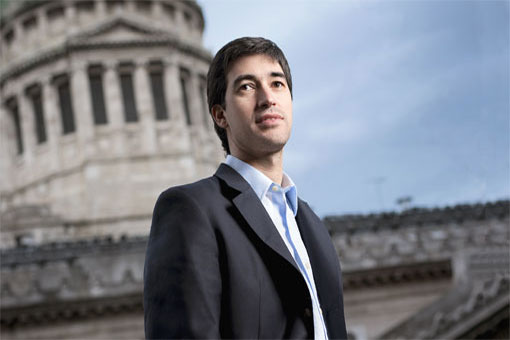Like many of my fellow citizens, I began participating in politics in the early days of Argentine democracy, following the fall of the military regime in December 1983. Back then, we were convinced that only through political involvement would we be able to contribute to the creation of a truly just and egalitarian society. After many years, Argentina was finally putting together a new democratic era, and the young adults who dreamed of attaining important public responsibility finally understood that their fight for social change would only be possible through non-violent means.
We can be proud that Argentina has had 26 years of uninterrupted democracy. It is a great accomplishment, considering what had preceded those years. From 1930 to 1983, Argentina’s governments lacked the essential qualities that make a democracy competitive, even though many called themselves democratic.
Since that first election in 1983, as we vote time and again, we have managed to fine-tune the essential elements of democracy and safeguard Argentine sovereignty. In those 26 years, not only have we consolidated formal and procedural democracy, as defined by Norberto Bobbio,1 we have also maintained and deepened respect for and defense of fundamental democratic rights—even through tough times.
The financial crisis of 2001, for instance, threatened the continuity of Argentine democracy. But in the end, like other crises, it underscored citizens’ determination to never return to the old days. Argentines have demonstrated a willingness to work together for solutions within the context of our newfound democracy.
Still, challenges remain. The new administration is faced with a contradiction between the logic of capitalism that drives the accumulation of wealth and the democratic urge toward equality. The consolidation of democracy in Argentina was marred by corruption. The questionable financial practices of governors, businesspeople and union leaders were coupled with direct or indirect threats against the press that tried to uncover them. The old authoritarian politics remains deeply ingrained in the exercise of public office.
The Argentine scholar Guillermo O´Donnell suggests that democracy depends not only on the observance of constitutional terms and public confidence that citizens’ civil rights and liberties will be protected but also on the abolition of authoritarian practices. Unless we guarantee greater transparency and efficiency in how public policy is carried out, the stability of democracy will be jeopardized. But in the end, this will be rendered irrelevant unless political democracy is balanced with economic growth and social equality.
Argentina’s late-developing capitalism has left many citizens feeling unprotected. At the same time, our generation has never experienced equitable distribution of income and wealth. If the middle class is doing well, everyone is doing well.
The workplace, and more specifically one´s job, is at the center of personal and family life. It is the point from which society is structured. Labor is quite possibly the single most important element in a person´s life. It is decisive for an individual´s identity, dignity and future.
Modern concepts of labor productivity and globalization have created a far more flexible labor relationship and, together with technological advances, changed the relevance and nature of manual labor.
The result has been a more volatile labor market in which jobs are lost with greater ease and workers’ rights remain more fragile. Unemployment is, regrettably, not just a statistic. The threat of losing one´s job is a constant issue that shapes labor and personal relationships. Labor has become more diverse, a fact rarely shown by statistics on the self-employed, part-time workers, temps, volunteers, vendors, etc. Seen from this standpoint, the line between employment and unemployment is increasingly fine.
The survival of Argentine democracy depends on reversing the historical mistakes of past Argentine governments and the stresses of economic change and globalization. Although the past six years were a time of sustained economic growth, the growth is not adequate enough to deal with the increase in poverty or to ensure social equality. Evidence shows that growth alone will not reduce social inequality.
Our party, Coalición Cívica-ARI, emerged from the need to construct an alternative to the traditional two-party system that—despite its continued dominance in national politics—has lost touch with the majority of the population.
We seek to represent a new political spirit and agenda based on three principles: ethics, respect for institutions and the redistribution of wealth. Our political platform strives to protect the most vulnerable (children, young adults and the elderly) and offer them income opportunities that are real and not merely rhetorical.
Since 1996, we have been pushing for the creation of the Fondo de Ingreso Ciudadano de la Niñez (FINCINI). The fund will establish a monthly income for all citizens, particularly targeting children, to serve as a basic social safety net and ensure basic nutrition and education. The FINCINI aims to prevent citizens from falling into severe poverty while creating a more efficient job market that will attack the problems of both unemployment and underemployment. In recognition of the difficult times that we have lived through since first proposing the initiative, other parties and social movements have now joined to support it.
As political leaders, we have an opportunity to create a different Argentina in which democracy is not merely an abstract concept, but a concrete option. An Argentina in which the government is accountable to its citizens and embodies non-violence, equality and personal freedom. But as a third party, Coalición Cívica-ARI faces a particular challenge of maintaining our basic principles while seeking multiparty and sectoral coalitions to achieve our policy goals.
I am convinced that this new Argentina is possible. We do not have to sacrifice the future to protect the present.
Footnote
1 Norberto Bobbio. El futuro de la Democracia, (Mexico: Fondo de Cultura Económica, 1984).





